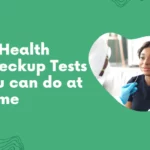Reviewed by Dr. Stephanie Egboh, September 2024
Polycystic Ovary Syndrome (PCOS) affects millions of women worldwide, but many remain undiagnosed. While many think it is just about reproductive health, it’s actually a complex hormonal disorder that can impact various aspects of your life, from your emotional well-being to your long-term health.
If you’re experiencing symptoms like irregular periods, weight gain, acne, or excessive hair growth, you might be wondering: How do you test for PCOS?
This article breaks down everything you need to know about PCOS testing, from understanding the process to accessing convenient and affordable options like a PCOS testing kit or a PCOS test online. We’ll also explore the often-overlooked symptoms of PCOS, helping you connect the dots and take control of your health.
At Healthtracka, we believe that knowledge is power. Understanding how PCOS is diagnosed and recognizing its wide-ranging effects are the first steps toward managing this complex hormonal condition.
Why is PCOS Testing Important?
Early diagnosis of PCOS is important for proper management of the condition. Without proper management, PCOS can increase your risk of serious health complications, including:
- Type 2 Diabetes: Insulin resistance, a common feature of PCOS, makes it harder for your body to regulate blood sugar, leading to type 2 diabetes.
- Heart Disease: PCOS is linked to high cholesterol and high blood pressure, both major risk factors for heart disease.
- Sleep Apnea: This condition, where breathing repeatedly stops and starts during sleep, is more common in women with PCOS.
- Endometrial Cancer: Irregular periods and hormonal imbalances can increase the risk of endometrial cancer.
- Infertility: PCOS is a leading cause of infertility in women.
Knowing if you have PCOS allows you to take proactive steps to mitigate these risks and manage your symptoms.
How Do You Test for PCOS? Understanding the Diagnostic Process

While there’s no single, definitive test for PCOS, physicians often rely on a combination of factors, including:
- Medical History: Your doctor will ask about your menstrual cycle, family history of PCOS, and any symptoms you’re experiencing (like those listed below).
- Physical Exam: This may include checking your weight, blood pressure, and looking for signs of excess hair growth or acne.
- Blood Tests: This is the core of PCOS testing. Blood tests measure hormone levels, specifically:
- Androgens: Like testosterone. Often elevated in women with PCOS.
- Follicle-Stimulating Hormone (FSH) and Luteinizing Hormone (LH): The ratio of these hormones can be indicative of PCOS.
- Anti-Müllerian Hormone (AMH) and Androstenedione: Often elevated in women with PCOS.
- Glucose and Insulin: To assess insulin resistance.
- Lipid Profile: To check cholesterol and triglyceride levels.
- Pelvic Ultrasound: An ultrasound can visualize your ovaries and check for the presence of multiple small cysts (follicles), although this isn’t always present in women with PCOS, and the presence of follicles alone does not confirm PCOS. The ultrasound also checks the thickness of the uterine lining.
The Rotterdam Criteria
Doctors often use the Rotterdam criteria to diagnose PCOS. You need to meet at least two of the following three criteria:
- Irregular or Absent Periods: This indicates irregular ovulation.
- Clinical or Biochemical Signs of Hyperandrogenism: This refers to physical signs like excess hair growth and acne or elevated androgen levels in blood tests.
- Polycystic Ovaries on Ultrasound: This refers to the presence of 12 or more small follicles in a single ovary or ovarian volume >10 cm3.
Unmasking the Hidden Faces of PCOS
While irregular periods and fertility issues are well-known aspects of PCOS, the condition can manifest in many other, often unexpected, ways. Understanding these “hidden faces” of PCOS is necessary for early detection and seeking appropriate support.
- Emotional Well-being: PCOS throws your hormones for a loop, often leading to mood swings, heightened anxiety, and an increased risk of depression. These emotional fluctuations, coupled with the visible symptoms of PCOS, can significantly impact self-esteem and body image.
- Weight Management: Insulin resistance, a common feature of PCOS, makes it harder for the body to regulate blood sugar, often resulting in weight gain, particularly around the abdomen. This can be incredibly frustrating, as even with diet and exercise, weight loss can feel like an uphill battle.
- Menstrual Irregularity: Unpredictable periods are a hallmark of PCOS. This irregularity can range from infrequent cycles to completely absent periods (amenorrhea), causing anxiety, disrupting daily life, and making family planning difficult.
- Fertility Issues: PCOS is a leading cause of female infertility. While many women with PCOS do conceive, the journey is often long and emotionally taxing, often requiring medical intervention like ovulation induction or assisted reproductive technologies.
- Skin & Hair Woes: Excess androgens (male hormones) can lead to persistent acne, stubborn weight gain, and hirsutism (excess hair growth) in unwanted areas like the face, chin, and chest. These visible symptoms can significantly impact a woman’s self-confidence and body image.
- PCOS and Fatigue: Feeling drained and exhausted is a common complaint among women with PCOS. This chronic fatigue can stem from hormonal imbalances, poor sleep (often caused by sleep apnea), and nutritional deficiencies, making it difficult to fully engage in daily life.
- Metabolic Health: Women with PCOS are at an increased risk of developing metabolic syndrome, a cluster of conditions that includes high blood pressure, high cholesterol, and elevated blood sugar. This cluster significantly increases the risk of serious health issues like heart disease, stroke, and type 2 diabetes.
- Sleep Apnea and PCOS: Sleep apnea, a condition where breathing repeatedly stops and starts during sleep, is more prevalent in women with PCOS. Disrupted sleep exacerbates fatigue and mood swings and can worsen other health issues.
- Effect of PCOS on Relationships & Self-Image: The visible and emotional challenges can impact social situations and relationships. Fear of judgment or misunderstanding can lead to social withdrawal, fostering feelings of isolation, and affecting self-worth.
- Long-Term Health: PCOS is a lifelong condition that requires ongoing management to mitigate long-term health risks. Without proper care, women with PCOS face a higher likelihood of developing heart disease, type 2 diabetes, sleep apnea, fatty liver disease, and endometrial cancer.
PCOS Testing Kit: Convenient and Affordable Options

Traditionally, getting tested for PCOS involved multiple doctor visits and lab appointments. Now, thanks to advancements in at-home testing, you can get a PCOS test online and collect your sample in the comfort and privacy of your own home.
At Healthtracka, we offer a comprehensive PCOS testing kit that makes the process simple, convenient, and affordable.
- Order Your PCOS Test Online: Visit our website and select the PCOS Test Package.
- At-Home Sample Collection: A qualified medical professional will come to your location of choice (home or office) for sample collection, maintaining your privacy and comfort.
- Fast & Accurate Results: Receive your detailed test results securely online within 1-3 business days.
- Doctor Consultation: Easily book a virtual consultation with a qualified doctor to discuss your results and receive personalized guidance. This will help you properly interpret your results and develop a management plan as may be required.
Taking Control of Your Health
If you suspect you might have PCOS, or if you’re experiencing any of the symptoms discussed above, don’t delay seeking testing. A PCOS test online through Healthtracka provides a convenient and confidential way to get the answers you need.
Remember, early diagnosis and management are key to living a healthy and fulfilling life with PCOS.
For more information on PCOS, visit these credible resources:
- Office on Women’s Health: https://www.womenshealth.gov/
- The American College of Obstetricians and Gynecologists (ACOG): https://www.acog.org/
Take control of your health. Visit Healthtracka today to learn more about our PCOS testing kit and start your journey toward understanding and managing your health.




